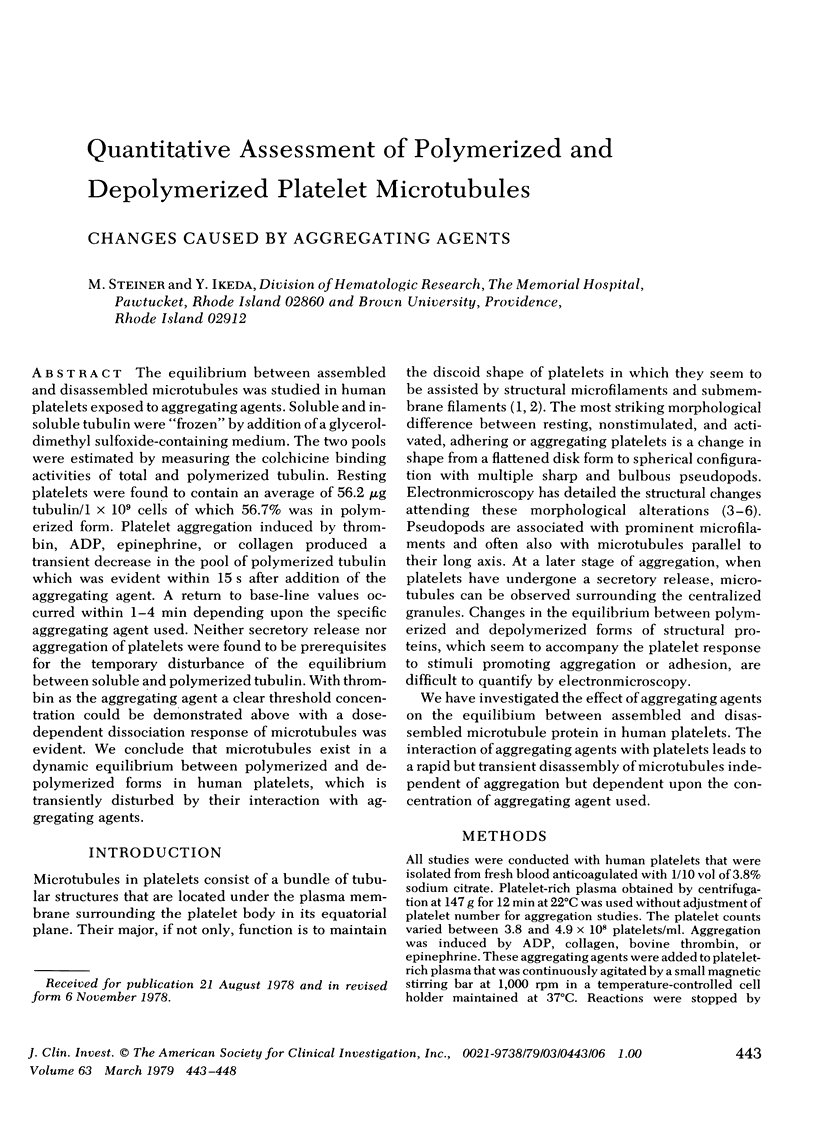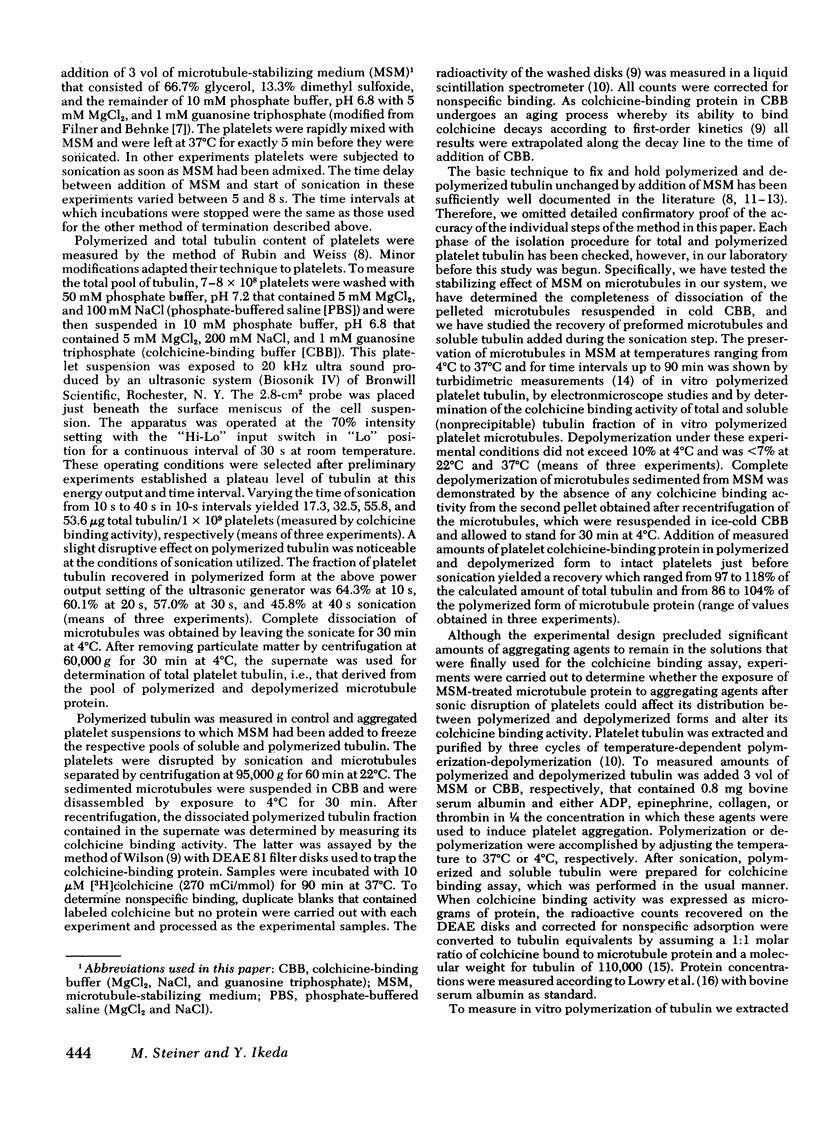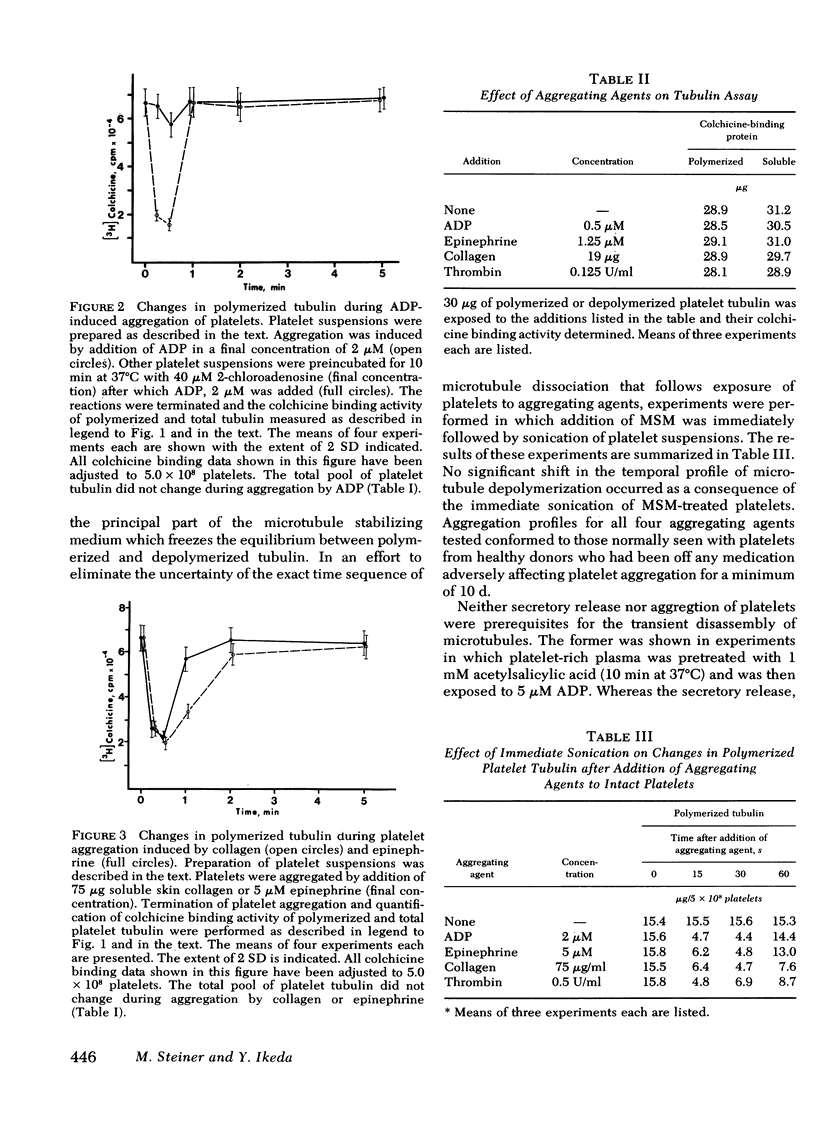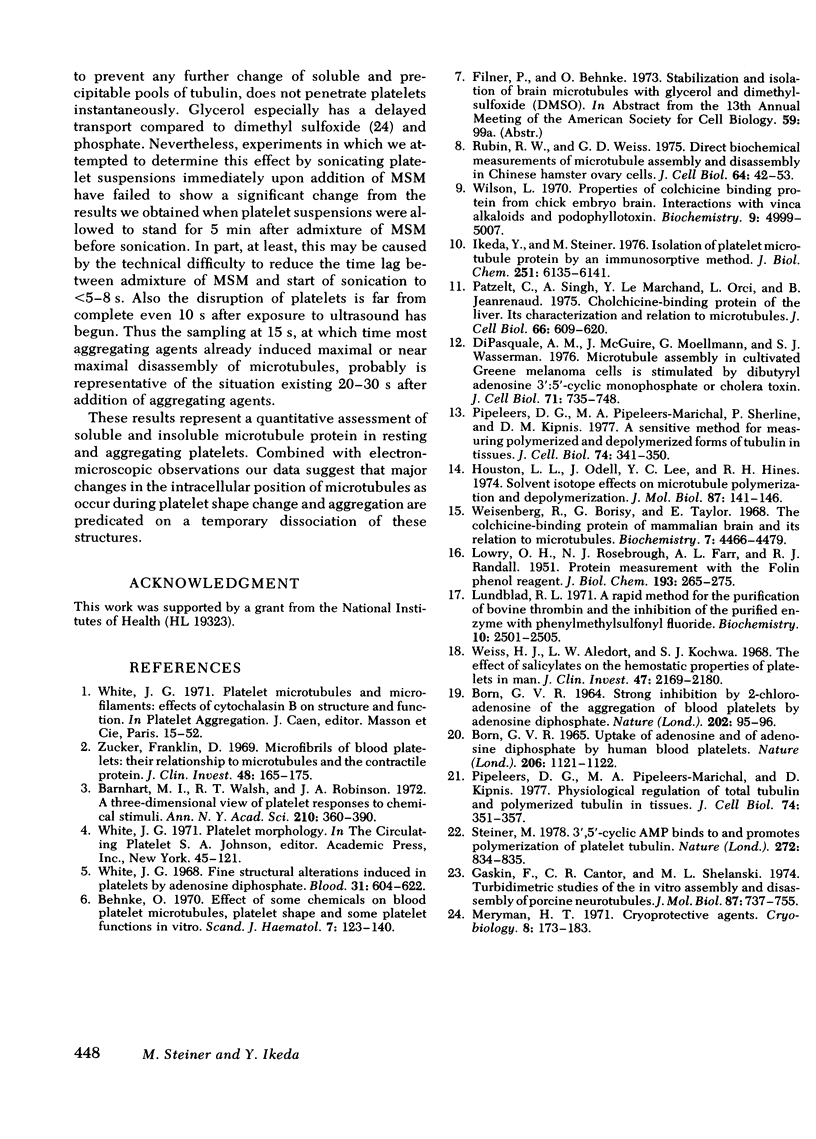Abstract
The equilibrium between assembled and disassembled microtubules was studied in human platelets exposed to aggregating agents. Soluble and insoluble tubulin were “frozen” by addition of a glycerol-dimethyl sulfoxide-containing medium. The two pools were estimated by measuring the colchicine binding activities of total and polymerized tubulin. Resting platelets were found to contain an average of 56.2 μg tubulin/1 × 109 cells of which 56.7% was in polymerized form. Platelet aggregation induced by thrombin, ADP, epinephrine, or collagen produced a transient decrease in the pool of polymerized tubulin which was evident within 15 s after addition of the aggregating agent. A return to base-line values occurred within 1-4 min depending upon the specific aggregating agent used. Neither secretory release nor aggregation of platelets were found to be prerequisites for the temporary disturbance of the equilibrium between soluble and polymerized tubulin. With thrombin as the aggregating agent a clear threshold concentration could be demonstrated above with a dose-dependent dissociation response of microtubules was evident. We conclude that microtubules exist in a dynamic equilibrium between polymerized and depolymerized forms in human platelets, which is transiently disturbed by their interaction with aggregating agents.
Full text
PDF





Selected References
These references are in PubMed. This may not be the complete list of references from this article.
- BORN G. V. STRONG INHIBITION BY 2-CHLOROADENOSINE OF THE AGGREGATION OF BLOOD PLATELETS BY ADENOSINE DIPHOSPHATE. Nature. 1964 Apr 4;202:95–96. doi: 10.1038/202095b0. [DOI] [PubMed] [Google Scholar]
- Barnhart M. I., Walsh R. T., Robinson J. A. A three-dimensional view of platelet responses to chemical stimuli. Ann N Y Acad Sci. 1972 Oct 27;201:360–390. doi: 10.1111/j.1749-6632.1972.tb16311.x. [DOI] [PubMed] [Google Scholar]
- Behnke O. Effects of some chemicals on blood platelet microtubules, platelet shape and some platelet functions in vitro. Scand J Haematol. 1970;7(2):123–140. doi: 10.1111/j.1600-0609.1970.tb01878.x. [DOI] [PubMed] [Google Scholar]
- Born G. V. Uptake of adenosine and of adenosine diphosphate by human blood platelets. Nature. 1965 Jun 12;206(989):1121–1122. doi: 10.1038/2061121a0. [DOI] [PubMed] [Google Scholar]
- DiPasquale A. M., McGuire J., Moellmann G., Wasserman S. J. Microtubule assembly in cultivated Greene melanoma cells is stimulated by dibutyryl adenosine 3':5'-cyclic monophosphate or cholera toxin. J Cell Biol. 1976 Dec;71(3):735–748. doi: 10.1083/jcb.71.3.735. [DOI] [PMC free article] [PubMed] [Google Scholar]
- Gaskin F., Cantor C. R., Shelanski M. L. Turbidimetric studies of the in vitro assembly and disassembly of porcine neurotubules. J Mol Biol. 1974 Nov 15;89(4):737–755. doi: 10.1016/0022-2836(74)90048-5. [DOI] [PubMed] [Google Scholar]
- Houston L. L., Odell J., Lee Y. C., Himes R. H. Solvent isotope effects on microtubule polymerization and depolymerization. J Mol Biol. 1974 Jul 25;87(1):141–146. doi: 10.1016/0022-2836(74)90566-x. [DOI] [PubMed] [Google Scholar]
- Ikeda Y., Steiner M. Isolation of platelet microtubule protein by an immunosorptive method. J Biol Chem. 1976 Oct 10;251(19):6135–6141. [PubMed] [Google Scholar]
- LOWRY O. H., ROSEBROUGH N. J., FARR A. L., RANDALL R. J. Protein measurement with the Folin phenol reagent. J Biol Chem. 1951 Nov;193(1):265–275. [PubMed] [Google Scholar]
- Lundblad R. L. A rapid method for the purification of bovine thrombin and the inhibition of the purified enzyme wtih phenylmethylsulfonyl fluoride. Biochemistry. 1971 Jun 22;10(13):2501–2506. doi: 10.1021/bi00789a012. [DOI] [PubMed] [Google Scholar]
- Meryman H. T. Cryoprotective agents. Cryobiology. 1971 Apr;8(2):173–183. doi: 10.1016/0011-2240(71)90024-1. [DOI] [PubMed] [Google Scholar]
- Patzelt C., Singh A., Marchand Y. L., Orci L., Jeanrenaud B. Colchicine-binding protein of the liver. Its characterization and relation to microtubules. J Cell Biol. 1975 Sep;66(3):609–620. doi: 10.1083/jcb.66.3.609. [DOI] [PMC free article] [PubMed] [Google Scholar]
- Pipeleers D. G., Pipeleers-Marichal M. A., Kipnis D. M. Physiological regulation of total tubulin and polymerized tubulin in tissues. J Cell Biol. 1977 Aug;74(2):351–357. doi: 10.1083/jcb.74.2.351. [DOI] [PMC free article] [PubMed] [Google Scholar]
- Pipeleers D. G., Pipeleers-Marichal M. A., Sherline P., Kipnis D. M. A sensitive method for measuring polymerized and depolymerized forms of tubulin in tissues. J Cell Biol. 1977 Aug;74(2):341–350. doi: 10.1083/jcb.74.2.341. [DOI] [PMC free article] [PubMed] [Google Scholar]
- Rubin R. W., Weiss G. D. Direct biochemical measurements of microtubule assembly and disassembly in Chinese hamster ovary cells. The effect of intercellular contact, cold, D2O, and N6,O2'-dibutyryl cyclic adenosine monophosphate. J Cell Biol. 1975 Jan;64(1):42–53. doi: 10.1083/jcb.64.1.42. [DOI] [PMC free article] [PubMed] [Google Scholar]
- Steiner M. 3',5'-cyclic AMP binds to and promotes polymerisation on platelet tubulin. Nature. 1978 Apr 27;272(5656):834–835. doi: 10.1038/272834a0. [DOI] [PubMed] [Google Scholar]
- Weisenberg R. C., Borisy G. G., Taylor E. W. The colchicine-binding protein of mammalian brain and its relation to microtubules. Biochemistry. 1968 Dec;7(12):4466–4479. doi: 10.1021/bi00852a043. [DOI] [PubMed] [Google Scholar]
- Weiss H. J., Aledort L. M., Kochwa S. The effect of salicylates on the hemostatic properties of platelets in man. J Clin Invest. 1968 Sep;47(9):2169–2180. doi: 10.1172/JCI105903. [DOI] [PMC free article] [PubMed] [Google Scholar]
- White J. G. Fine structural alterations induced in platelets by adenosine diphosphate. Blood. 1968 May;31(5):604–622. [PubMed] [Google Scholar]
- Wilson L. Properties of colchicine binding protein from chick embryo brain. Interactions with vinca alkaloids and podophyllotoxin. Biochemistry. 1970 Dec 8;9(25):4999–5007. doi: 10.1021/bi00827a026. [DOI] [PubMed] [Google Scholar]
- Zucker-Franklin D. Microfibrils of blood platelets: their relationship TO MICROTUBULES AND THE CONTRACTILE PROTEIN. J Clin Invest. 1969 Jan;48(1):165–175. doi: 10.1172/JCI105965. [DOI] [PMC free article] [PubMed] [Google Scholar]


